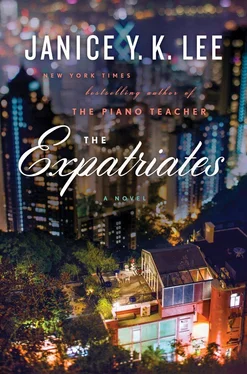This was what bothered her: the presumption of the expatriates in Hong Kong. It is unspoken, except by the most obnoxious, but it is there, in their actions. The way they loudly demand ice in their drinks or for the AC to be turned up or down or for “Diet Coke, not Coke Zero,” as if everyone thought such a distinction was crucial. The idea, so firmly entrenched, that they could be louder, demand more, because they were somehow above — really, better than — the locals. How did that still exist in this day and age? And it was in her. That was the thing. Every time she spoke louder than a local because he or she didn’t understand what Margaret was asking, every time she insisted on her way, was rude, she felt it in her and was ashamed.
So instead she had groveled, beseeched, stayed long enough at the building that the woman realized she was not going away. Margaret had led her outside and pointed to the sign, and the woman had taken her, grumbling, to the elevator, which they took up to the third floor. There, in a glum hallway, she paused outside a steel door that was painted a glossy olive green that was stripping away in long ribbons.
“ Bat cheen ,” the woman said in Cantonese, holding up eight fingers. Eight thousand. Outrageous. A foreigner’s price. The room was probably full of asbestos and cockroaches.
“Okay,” Margaret said before the woman had even turned the key and opened the door.
An iron bed, twin size, or possibly even smaller. A filthy thin mattress, pink, with brown stains. No sink. When Margaret wrung her hands, pretending to wash them, to ask where the sink was, the woman pointed to the miraculous thing in the room: a tub. As if to say, why would you even ask? But a tub in this kind of space was a mistake. Certainly. It was ugly, a small, plastic thing, but was newish, bought in the last five years, installed with the water line coming straight up outside of it. So you wash your hands in the tub. Margaret could not imagine what it had replaced. There were no cooking facilities or closets or anything that most people would ask of a living space. The toilet was behind some plywood painted white. She was lucky. Most of these kinds of places had a bathroom down the hall. It was as if someone had taken a random slice out of a normal living space and this is what had been in that asymmetrical, random segment. But it was perfect for her. She gave the woman eight thousand in cash, swiftly withdrawn from the ATM conveniently located outside, signed some Chinese contract, and got the key the same day.
There she imagined what people would think about what she did if they knew. She imagined they would think she was having an affair, was running an illegal operation of some sort. In fact, her utter conformity, even in isolation, amused her. She had gone out and bought a cheap mattress and pillow and had it delivered. She left the old ones in the hallway, unsure of disposal procedures, and they were gone an hour later. She bought cotton sheets and had them washed by the laundry business just outside — she couldn’t bring them home to Essie, too many questions. She bought pajamas from the China Emporium, pale blue with pandas embroidered on the right front pocket, and she put them on and she lay down on her new bed with her new sheets, all brand-new and nothing to do with her real life, and she lay there, arms by her side, eyes closed, and felt at home.
She had scrubbed the entire room, mixing up buckets of bleach and soap and mopping until the mop came away clean. After there was some semblance of overall cleanliness, she went at the corners with a toothbrush. She was thinking about painting the walls. Everything she did there made her happy.
The hours stolen there vanished into some forgotten morass of her life. Clarke had no idea where she was. He thought she was at home or shopping for food or picking up the kids. She could have told him that she had rented a work space or a studio, but she didn’t. She squirreled away money by buying groceries at the local market instead of the gourmet stores and was chastened to see how much money that left for her to pay for the apartment.
But this is what she did: She lay on that twin bed, or in that tub, and she lay there without a thought in her head. If she did think, it was about what her life would be if she only had this life, this one room, this one place.
Of course, she had to get more things, eventually. A soap dish, a bar of soap to put in it, a toothbrush, a small tube of toothpaste, a single-cup coffeemaker, a white mug, a package of three hand towels, red, yellow, blue-striped — primary. A small space heater for when the weather turned cold. She bought them at the local Price-Rite, a fluorescent-lit shop in the basement of a shopping mall, with odd items like Japanese scrubbing cloths and purple humidity-absorbing beads. Her small collection of possessions filled her with gratitude in a way that her house full of furniture in Repulse Bay did not. She got to know the neighborhood around her: the flower shop with cheap, bright flowers, no expensive peonies or orchids, just geraniums and gerbera daisies; the steaming noodle shops, with their round tables and stools, chopsticks bunched in the middle like utilitarian centerpieces; the tiny stationery shop; the dress shop; and their proprietors. She bought lunch and ate it in the room. She brought her garbage out with her and threw it in the public bin. She kept the enterprise simple, and so it all worked.
She squeezes the washcloth over her arm so soapy water trickles down in slow rivulets. So theatrical, she thinks, like something you learn to do by seeing it in a movie. “This is how to relax, this is how to enjoy yourself.” She rinses out the washcloth, wrings it, and places it over her face, leaning back.

She was not supposed to have met Clarke.
She was living in New York when she did, working at an advertising agency. She had been at home when she got a tipsy phone call from two girlfriends who were at a party three blocks away. “Come!” they had said. “It’s so close to you. We’ll have dinner after.”
After putting on lipstick, she made her way over, only to find that the party was an intimate affair of thirty-five, an engagement celebration with family and close friends, in a palatial apartment on Fifth Avenue. Her friends were happy to see her but also busy talking to other people. Having been lured into coming by the promise of dinner afterward, she tried to hover invisibly by the window overlooking Central Park and spent her time trying to figure out who was the host and who were the guests of honor, so she could avoid their field of vision.
Unfortunately, everyone there was extremely kind and concerned that someone was being ignored, so she had to fend off questions from strangers about whom she knew and where she was from.
Sucking down her second glass of wine and cursing her friends, she looked up to find Clarke.
“Are you crashing?” he said with amusement. He was handsome, yes, but had crinkly, kind eyes. Older than she, mid-thirties.
She mumbled into her glass.
“Come on, fess up,” he said.
She made a decision.
“Who the hell says ‘chaise lounge’?” she asked.
“What?”
Good. She had startled him.
“I was talking to someone and they said ‘chaise lounge.’ But it’s ‘chaise longue.’ You know? It’s French. Means ‘long chair.’”
“I’m proud to say I’ve never said either,” he said.
“Americans are so idiotic,” she said.
“Aren’t you American?”
“Yes,” she said, all twenty-six-year-old bravado. “So what?”
He laughed. “You’re feisty,” he said. “You’re lucky you’re cute.”
Читать дальше













